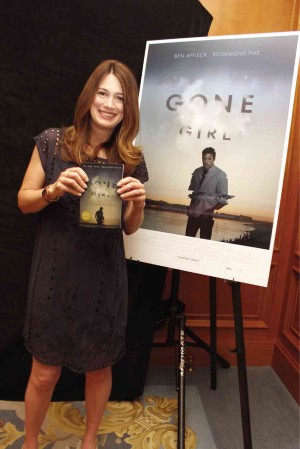‘Gone Girl’ author successfully adapts bestseller to film
LOS ANGELES—Not many beloved bestselling novels get adapted to the big screen and satisfy their readers. Rarer still is that the author himself writes the film adaptation and succeeds. Gillian Flynn manages that feat with her film version of her tour de force thriller, “Gone Girl.” That it’s her first crack at screenwriting makes her achievement even more stunning.
With David Fincher directing, Gillian’s bleak portrait of an American marriage—between writers Nick (Ben Affleck) and Amy (Rosamund Pike) Dunne—amid this era’s media sensationalism becomes an even more biting, albeit entertaining satire of our times. The film teems with terrific performances, down to the well-chosen supporting cast, and memorable lines from Gillian, who wrote for Entertainment Weekly until she was laid off in 2009.
In our recent interview at The Ritz Carlton New York-Central Park, Gillian is a smiling, charming presence, not at all the dark, scowling personality we half-expected. She’s beautiful as well. Below are excerpts from our chat:
The book and movie are about projected images and disguises. How important is honesty in your life?
I wrote “Gone Girl” as a newlywed. It’s an awful thing to write when you just got married. It takes a very confident husband to not blink his eye at that. I had spent a lot of time thinking about what marriage meant, what marriage should be, good marriage versus bad marriage, and how honesty is important.
The screenplay’s a lot about how much truth-telling we do. We put on facades for each other. We are all in an elaborate con game. When we’re meeting another person, we’re presenting the best of ourselves.
What about you when you were a newlywed?
I was lucky that I didn’t want to get married for a long time. I didn’t have a particular interest in it. When I met my husband, I knew he was the right person, because he liked me for all of my weird stuff in addition to the good stuff. When we got to know each other, we felt very comfortable and honest with each other—not brutally honest, but just the right amount of honesty.
Can you talk about your process in writing this book? Where did you write it?
In “Gone Girl,” there are a lot of different pieces, so to keep all my thoughts and facts straight, I would take sticky notes, then stick them on the wall—about facts I wanted to check or what I wanted to include.
By the end of writing it, my office was fluttering with sticky notes and things I’d taped to the wall, and legal pads.
Can you talk about “Dark Places,” the book and the movie?
“Dark Places” was my second book. I grew up on the border of Kansas, so I knew the story of Truman Capote’s “In Cold Blood.” It starts with a kernel of that (story)—in a farmhouse in the middle of Kansas, a family is brutally murdered. What happened? From there, it goes to a very different place than “In Cold Blood.”
Again, “Dark Places” has a lot to do with the media and our consumption of true crime stories. The main character, Libby, is the only one who survived the massacre of the family, and she became this media darling. She has survived on a trust fund. She became famous for the awful thing that happened to her family. It’s about what that does to a person, when from childhood her sole claim to fame is the worst night that ever happened to her family—and how that warps her.
Where did your fascination for the darker stuff come from?
When I was a kid, when we picked fairy tales, my cousins would pick the princess book. I would pick the witch, because she’s the one with the back story. I wanted to know what happened to her to turn her so evil. I was always fascinated with that—why bad things happen, and why people do awful things to each other.
Do you think Amy is an empowered woman or she has psychological issues?
Certainly the latter. I’m trying not to give away any spoiler. There have been accusations that I’m a misogynist, because I write that kind of stuff. I won’t present her as the wonderful, epic figure of empowerment that all women should be. But, she’s a character who has her own volition. She does her own moving and making it in the world. The fact that we don’t see that very often from a female character and that’s ascribed to misogyny is very interesting to me.
There’s a lot going on with Amy. I wouldn’t want to be best friends with her. But, she’s a female character who has her own energy, has her own mind and will—which, that part at least, makes me say, “Go girl!”
E-mail [email protected]. Follow https://twitter.com/nepalesruben.
